|
It was a Christmas service a number of years ago. My daughter, Amanda, reflecting on all the nice music and singing, then she noticed there was a decorated Christmas Tree with (probably fake, empty) wrapped boxes scattered around the base––very much out of place in a church, but nice. Quaint. But not an image of the original Christmas story. She wrote on a scratch piece of paper she found in the pew:
Yet, we continue to underestimate our unbelieving neighbors and friends. We can often dismiss the possibility that, in their own way, they might actually be seriously seeking answers—ultimate answers about life, faith, and death. Often, it is one particular version of Christianity that is rejected as the place to discover the answer to their seeking questions. Christian sociologist Os Guinness writes that to the believer Christianity “was once life’s central mystery, its worship life’s most awesome experience, its faith life’s broadest canopy of meaning . . .” But, today, he laments, no matter how passionate or committed an individual believer may be, Christianity often amounts to little more than a private preference, a spare time hobby. For serious seekers, such spare-time faith is not a solution to their deepest needs. Christianity must be more than a cozy warm blanket, something more ultimate to raise one up above one’s needs. Amid the glad tidings often associated with the Christmas story is an oft-missed dose of “reality” etched into biblical scene. Along with shouts of exultation from shepherds, homage from wise men, angels praising God, there is another voice often missed: “a voice heard in Ramah, wailing and loud lamentation, Rachel weeping for her children…refusing to be consoled, because [her children] were no more” (Matt 2:18). These are strange words coming in the midst of this joyous occasion. Yet, they are a reminder that lament and despair grip the human experience. The first time we meet Rachel is that wonderful moment when she thought she would be marrying the love of her life, the OT patriarch Jacob. But the story turns quickly to despair: Her father tricks Jacob into marrying Leah, Rachel’s older sister, first. Making matters worse, Leah has eight sons as Rachel remained childless; and, then, we hear her weigh the depths of her barrenness. God eventually takes Rachel’s reproach away by giving her a son, Joseph, Israel’s future deliverer. But, while giving birth to her second son she hears news that Joseph, her first-born, had been murdered. We, then, learn that “Rachel began to give birth and had great difficulty” and reflecting on her anguish, she names her new son “trouble” (Benjamin) and dies and is buried by the roadside on the way to Bethlehem. The roots undergirding the story, as well as the original Christmas story in our Gospels, are surrounded by the swing between gladness and suffering, between hope and despair. The realities of life. The original Christmas narrative—the one that is inspired and finds a place in Scriptures—forces the reader back to the Rachel story, compelling us to include lament in the Christmas story. Certainly the Gospel writer wants us to know that God has sent his only begotten Son to be the deliverer of all mankind, the ultimate Joseph. Yet, Rachel and her cry seep into the first Christmas story. We need to know that despite joyous strains elsewhere, some refuse to be comforted except only by God’s own intervention. The Gospel story is pictured in Rachel’s cry, that is, of God’s Son ending up on a cross, rejected, and dying the cruelest of deaths. The reality of life, its pain and often unfairness, demand that one must turn to the God of Golgotha, that lonely hill where hanging between two thieves, the innocent Lamb of God was slain, who alone can provide the relief, the comfort we deeply need; not simply mere sentimentalism, a Hallmark Card, or a “spare-time” religious experiences. No other hope other than God’s work in Christ can penetrate our neighbor’s or our own deepest hurts or pierce our loneliest moments, or lift us above our needs. Amid the tinsel and cheerfully wrapped presents, let us remember Christ’s birth wasn’t to increase retail, but to bring good news that would meet the deepest needs of the human experience. Our unbelieving, skeptical friends and neighbors deserve no less. And in this, they might find the real Christianity, and the hope they long for.
0 Comments
 I am accused of being a Christmas curmudgeon, a grumpy older man who is down on Christmas cheer . . . I get it . . . some might even be thinking to themselves, “When is he going to talk about the joy of Christmas?” Well, I get we need joy. I had a great childhood and Christmas for me was marvelous, incredible . . . my childhood stepfather (as some of you know) was the heir of a Toy Company, the Gotham Steel Toy Company in fact . . . and I received amazing Christmas presents! I was a very popular neighborhood kid at Christmas time. So, I get it. Christmas is supposed to be this wonderful, joyous, marvelous time of year. But . . . I am no longer that privileged child. I no longer have the luxury to think as a child. This season for many is a reminder of what is lacking, that someone is missing; a time of shame, loneliness, heart-brokenness . . . and everywhere one turns they are told that they should feel joy . . . even at church. Yes, the original story has joy it in . . . but this is no commercial, consumer joy, or joy induced by decorations and nice music and great deals at Target. Yes, Elizabeth is told she will have “great joy” at the birth of John . . . but this “joy” is because her childless-shame would be finally taken away. Yes, as in our text this morning, the wise-men from the East have joy in seeing the Star, but we forget this is in the midst of a story about an jealous King who declares treason on this babe born outback in a stable, a story that ends with the slaughter of innocent children two and under, a story of exile and running away to seek safety in a foreign land. The real Christmas story is far closer to the reality of so many populations of people on this plant, the bottom-billion, than the commercial one we are surrounded by and the one presented by us in church. Frankly, the poor homeless on the street, under the bridge, off in a corner seeking shelter from the elements have more in common with the original Christmas story than most of our resource-rich Christmas experience. And strangely, us, churches often harness the commercial version and Christmas consumerism to get people into our buildings at this season, when it is the original story they need, need for life now and for their soul, for there is eternity at stake in this original Christmas story. Part 2 tomorrow . . .
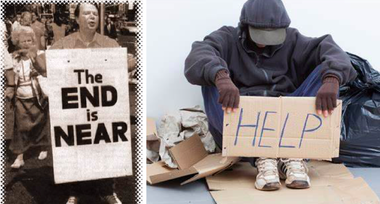 We’ve come to an “end time” text in Matthew, chapter 24. Too many Christians, preachers, and modern, self-appointed “prophets” mine this chapter in search for how they may “discern” the signs so they can announce “the end is near” (usually accompanied by some action that is needed, everything from send money, give more money, stop letting, go vote . . .) Even though we have 2000+ years of everyone getting it wrong, plenty still predict and announce. When I was pastoring in Pennsylvania in 1987, I received a free book in the mail, 88 Reasons Why Jesus is Coming Back in ’88. Well, Jesus didn’t. So the next year, I received a new book from the same author entitled, 89 Reasons Why We Were Wrong in '88 and Why Jesus is Coming Back in ’89. You can’t make this stuff up. Well, here we are, it’s 2019. And, we still have sign pointer-outers and prophetic manipulators and, even, innocent, well meaning Christians seeking signs and pointing out why “we’re living in the end times.” If you skim through Matthew 24 and Matthew 25 (which should be like one chapter together) you will encounter the twin themes of “it’s not the end” and “you don’t know when the end is coming so be ready.” So, perhaps we should take this to heart and listen better to Jesus. Being ready isn’t about discerning the times and looking for signs, but enduring to the end. “You see these sign, endure to the end (since you don't know when it’s the end end).” What’s truly interesting, the parables that follow the “signs” section of Matthew 24 all push the reader toward being ready because you don’t know when it’s the end end. There are some important parallels we gloss over, or ignore, or don’t take into account, namely each of the parables–the faithful servant (24:45-51), the ten virgins (25:1-13), and the “faithful/unfaithful investors” (25:14-30) and the “sheep and the goats” (25:31-46)–all end in pretty harsh judgement . . . Matthew intends some parallelism here . . . they are all teaching basically the same thing. So, this is important to grasp. While waiting and being ready and seeking to endure, the Christian community is to be characterized by . . . go ahead, read Matthew 25:31-46 . . . you got it . . . by feeding the hungry, giving drink to the thirsty, by welcoming the stranger (don’t think US Border, that, too, is a misdirection; think your home, your church, your neighborhood, your circle of friends and acquaintances), by clothing the naked, and by visiting the sick and imprisoned. Matthew connects the “end times” teaching and the “sheep and the goats” judgment, so we should as well. Church is expected (a church in a place, in a neighborhood is expected) to live (together) in such a way as to create space (i.e., habits, lifestyles, life) to make it possible for the hungry to be fed and the stranger welcomed and the sick and imprisoned visited for the “end” is nigh in that Christ Jesus comes to us in the poor, the hungry and thirsty, the naked, the sick, and the imprisoned. So, Christian, stop seeking signs. Endure ’till He comes by doing what Jesus has been doing (in Matthew since chapter 4, i.e., ministering to the poor, the outcast, the unclean, the marginalized, et al.). Stop pointing out signs (“Oh, it must be the end, see how bad it’s getting!” or “Look what’s happening with that country . . . or those politicians . . . or those people!”). Just stop it. And, stop listening to it. It’s distracting you from true endurance, which means actively helping, serving, caring for the poor, the outcast, the marginal, the unclean. 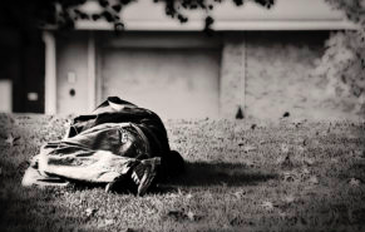 Furthermore, there is an interesting twist afoot when we consider the thread of “second coming sign” texts in Matthew 24 and the juxtaposition of the three Matthew 24-25 parables and the parable of the sheep and the goats: The three parables, along with the noted (above) harsh conclusions, are also stories about a Master delayed (χρονίζω, chronizō) and who comes (24:48-50), a bridegroom delayed (χρονίζω, chronizō) and who comes (25:5, 10), and a Master who goes on a journey, “yet after a long time” (μετὰ δὲ πολὺν χρόνον, meta de polun chronon)* comes (25:19). Then in the sheep and the goals parable (25:31-46), we have the Son of Man (i.e., Jesus) who comes (25:31). Here, we have a slight nuance to the concept of “coming,” namely the “coming” judgment is based on the incidences of Jesus coming in the persons who are poor, neglected, under-resourced, unclean (i.e., hungry, thirsty, naked, homeless, sick, and imprisoned). Of course there is a final “coming” when Jesus, as the Son of Man judges and separates the sheep and the goats. Yet, this coming-judgment is based on what the people (i.e., Christians, at least outwardly) do and do not do to/for/with the Jesus who had come as someone hungry, thirty, naked, homeless, sick, or imprisoned: “Truly, I say to you, as you did it [or not did it] to one of the least of these my brothers, you did it [or not did it] to me” (cf. 25:40, 45). It seems clear, from the parallels in the parables and the juxtaposition of the coming-judgment of the sheep and the goats, that is, being ready, staying alert, staying woke while Jesus “delays” and being prepared for the final coming is repeating the same ministry that Jesus had illustrated (i.e., the fishing) in Matthew 4-23, that is healing and touching and feeding and caring for the poor, sick, and unclean. The true signs of His coming is the church among the poor, outcasts, marginalized, and unclean. Don’t be a goat (nope). Be a sheep. Be ready. Be prepared. Be truly woke . . . when Jesus comes to you as one of the least of these (or go to them, be among them), so that you may be ready when he comes as the Son of Man on that Day.
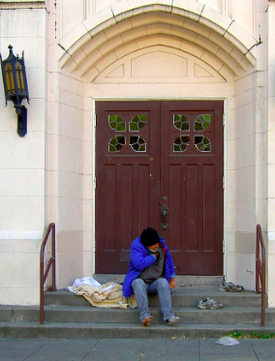 One of my heroes of the faith is A.B. Simpson, founder of the Christian and Missionary Alliance (1843-1919). Called to a rather prestigious NYCity church (a Presbyterian church!), he began to have a burden for ministry among the poor and street people. He'd preach on the street; street people converted; and, he brought them to church . . . was summarily disciplined and removed from the pulpit (on record, it was over his changed position regarding baptism, but there is no doubt as to the real reason was bringing those people into the paid-pews of our church). Having those street people (i.e., the bottom demographics of NYCity) enter Simpson's church was like the time Jesus took to turning-tables and whipping merchants who filled the temple court (probably Court of the Gentiles) and, then, the crowds of the poor, marginalized, sick, disabled came into the temple (assuming there was a place for them now that the merchants were chased out) . . . Jesus overturned the status quo and mis-use of the temple sacred space and the very crowd that was disallowed, then, came in . . . We often read past quick verses that give some context to the narrative. Matthew's account tells us immediately what happened after the table-turning: “And the blind and the lame came to him in the temple, and he healed them” (21:14). Matthew then tells us the temple leaders “were indignant” (v. 15). The Matthew 21 OT quote used to prophetically justify Jesus’ table-turning action was to remind Israel’s temple-leadership that God's temple was to be a house for ALL people (Matthew 21:13; cf. Isaiah 56:7). When we turn to that Isaiah 56 quote, we read in the very next verse: “The Lord God, who gathers the outcasts of Israel, declares, ‘I will gather yet others to him besides those already gathered’” (v. 8). And, this is exactly what happened in the over-turning-tables story in Matthew–in the very next verse: “And the blind and the lame came to him in the temple, and he healed them” (Matthew 21:14). If one pulls out the other likely OT reference to a “house of prayer for all people,” namely Jeremiah 7:11, there, too, we find in the context the marginal and bottom-demographics that have been left out, for we read in Jeremiah 7:5: “For if you truly amend your ways and your deeds, if you truly execute justice one with another, if you do not oppress the sojourner, the fatherless, or the widow . . .” (v. 5). Let's get this right: the over-turning-tables scene is about God’s people (more so, the visible ones that makes up both the truly elected and those who claim Christ but are not necessarily truly God’s people), the very temple (i.e., the place of God's dwelling and manifest presence--which was the temple in the OT and now the visible church, i.e., churches scattered throughout the earth) has barred the marginalized and placed barriers to the bottom-demographics from the temple/church sacred space. Like Jesus as he makes room for them in the temple, the significance of this Matthew 21 text is to apply to church (not in a general, universal church way--whatever that is--but, to the local church, my church, your church) by the intentional creating of room, restoring sacred space (i.e., literally NT table fellowship, however it looks today) for the bottom-demographics to be among us (or us among them, better, still). Or, we, too, may face Jesus’ over-turning-tables judgment.
patterns of church) and execute justice one with another (i.e., our neighbors) and not oppress the sojourner, the fatherless, or the widow . . . among church. This is not a State funded plan or program. This does not need to come from the Supreme Court or any federal law. This is church. Is it no wonder we hear a few lines later, in Matthew 21, Jesus would tell the temple-leadership who had a problem with the incoming bottom-demographics: “Truly, I say to you, the tax collectors and the prostitutes go into the kingdom of God before you.” This is an ecclesiological (aka a church) issue, the neglect of our poor and marginalized neighbors, and the giving of access to our fellowship so that they may have full access to the Father. We need to rethink church.
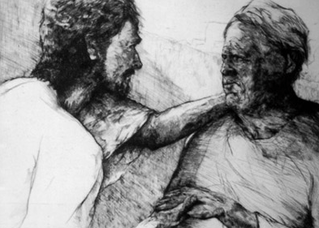 I am jumping ahead a bit in my thread on the Sermon on the Mount, but, there is something very narratively-interesting (yes, I made up a word here) about what story Matthew chooses to come right after, that is, to immediately follow the Sermon on the Mount. He could have picked from dozens of known Jesus-encounters or teachings, but this is the story he choose for us to hear right after the Kingdom-inviting-and-living-righteously-sermon that began at 5:1 and concludes at 7:29. Here is the text of Matthew's post-Sermon on the Mount thread. Afterward, then, please note with me a few narrative inferences that seem very applicable to the church that stands in front of the narrative. (That's us!)
First, note this is purposeful (i.e., a calculated choice by Matthew), for there is a connection to the “crowds” from the the beginning, whom Jesus was ministering to at the start of the Sermon (4:23-5:2). This is Matthew's way of connecting the Sermon to the encounter Jesus will have at the head of chapter 8. The reader is not to disconnect the Sermon on the Mount to this following event, thus leaving the reader to ask, what is the significance of the leper in this narrative to what we just heard from Jesus on that mountain? Second, Jesus had just made an invitation into his kingdom and explained what righteousness was, not only required in this kingdom, but was, also, to flow from living out the kingdom and his first encounter is a leper. This, of all people in the land, is certainly one of the target groups of the Beatitudes (poor in spirit, mournful, meek/powerless), a much marginalized social class, and very unclean. Third, note that Jesus touched the leper before he healed him—significant, because you don’t touch lepers and if you do, you share in their uncleanness (get it?). Then, finally note, the kingdom is realized when “immediately” the leper was made clean. You must remember that pure of heart in 5:8 is actually [socially, religiously] “clean of heart.” So there is a definite narrative pun (connection) here for the reader to catch. This narrative was no interruption, but was the sermon's application. Now go and do likewise.
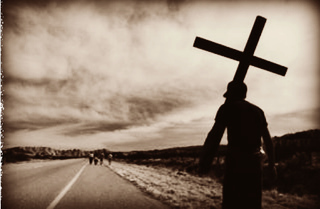 Let’s reconsider two Biblical thoughts from our favorite-to-quote-bucket–“take up your cross” and “Whoever finds his life will lose it, and whoever loses his life for my sake will find it” (Matthew 10:38-39)–and see if we can save them from the pile of Christian clichés. We should pay closer attention to the narrative context as we read the text from which these two are found, before we make application: that is, hearing the significance, then making application. Taking up one’s cross is often used devotionally to move Christians toward obedience; and, losing-finding one’s life is often used toward the nonChristian to draw them to Christ. Not bad things (or outcomes), but rather than a general (privatized) application of these–which, by the way, these are toward Christians for faithful perseverance and endurance in the faith, which is the context, e.g., “. . . the one who endures to the end will be saved,” 10:22b–and, thus, a more specific application is warranted. First, the context is specific:
The immediate paragraph context is the strain and conflict between believing and unbelieving household members. Household conflict in general would have threatened heir legitimacy (the reason for the household in the first place in Greco-Roman culture and social construct, to produce and protect a legitimate male-citizen heir), the passing on of wealth and family social standing, and would have put at risk one’s survival . . . so literally one “saves” one’s life through the family/household and “loses” one’s life apart from family (that is, a household under a patriarch, male-head-of-household). This was the Greco-Roman way (in the time of New Testament). This makes better since of Jesus’ words: “Whoever finds his life will lose it, and whoever loses his life for my sake will find it” (Matthew 10:39). Thus, taking up one’s cross (v. 38a) is related to what happens when following Jesus puts one, “for Jesus’ sake” (v. 39b), in a place where one can no longer count on the social construct available for life (literally for survival). So, the significance of this text and these “clichés” is, following Jesus (which this text is about; v. 38b) means to die to (i.e., no longer count on or trust) the ways in which our social constructs and cultural norms provide identity, security, and worth. The Christian’s identity, security, and worth is located in Jesus and in his cross, which, then, sets animosity, alienation, and, potential, hostility in within the world (i.e., society and cultural and institutional place) that currently gives one identity. This is truly Christian discipleship, that is, following after Jesus. This is losing one’s life (i.e., giving up, abandoning, rejecting, not trusting in such social norms--again--for identity, security, and worth) to find real, true life through following Jesus. The question would, then, be what social constructs and cultural norms give us (give you) identity, security, and worth? These we need to die to in order to have real, true life. This is what it means to actually follow Jesus.
The goal of redemptive history is the cosmic restoration of creation. This is the story of the Bible. This is the church’s story. This should be your church's story. God has determined to use a redeemed people to herald this message. The ekklesia of Jesus, the gathered-church, composed of redeemed and restored people, living out the gospel, illustrating this cosmic restoration through its treasonous worship of the risen Jesus, the Lord over all other claims to the throne, its missional behavior to its neighbors, and , particularly, through the fellowship of restored human relationships among strangers and unequals. The gathered-church of the Lamb of God is unlike any and all other rebellions and resistance movements: church is not (ever) aligned with a government or party or state or king in order to violently overthrow or by means of State-authority and any form of violence to maintain; church is never (ever) aligned with the spilling of blood through strength or cunning to change or maintain the status quo of an unredeemed social structure or cultural state of affairs; and, where privileged to participate, church does not count on the ballot-box to overthrow power or maintain a particular person or party in power. The church uses a table of fellowship over food, broken bread, and a raised cup of allegiance to the risen King of kings and Lord of lords, now seated at the right hand of God in the heavenly places. This has been and is God’s way of, not saving the State or some preferred demographic or cultural value, but demonstrating that all of history is moving toward His ultimate conclusion of a restored creation. How does God reveal and accomplish this purpose of history? Little and grand tables, scattered throughout time and place, some well noticed and many hidden in the back alleys and among the margins–this has been where God does his rewriting of corrupted history and the deconstructing of the powers of humankind. This is church-story. Not just the best story. But the true story of history. This is the story you and I are invited into; and, the gathered-church is the place God restores all things. Not the battlefield. Not the ballot box. But at tables of strangers and unequals.
 So many values and virtues, which came from the appearance and presence of Christianity in the world 2,000 plus years ago, in our culture, exist today as noble and ideals amongst society, so much so that the intent of Jesus’ Blesseds are now tempered, eased, toned down, dulled, softened. Their bite taken out. Their edge taken off—so that their radical, self-righteous slaying, Christendom destroying, idol bashing, social leveling, culture reversing power is missed and dismissed by much of the church and ignored as simplistic and assumed platitudes by modern crowds. The gospel is actually missed.
We exist at a time when the Cheshire cat smile of these Beatitudes exist (in vague social and cultural forms and weak values and virtues, and, even, as political correctness); but the cat (i.e., the intent Jesus had in the first place) is all gone. These verses, Matthew 5:3-12 (above), were the most oft quoted, referred to, and referenced New Testament texts in the first 150 years of the church. They were the call (invitation) to the faith, the test of faithfulness, and the bane and annoyance of existing powers. You want to know how Christianity spread so rapidly and the church increased beyond imagination in the first 150 years--they actually believed the Beatitudes. And, did them. The early believers, mostly poor and lacking resources, small and powerless and often hidden, lived the life the Beatitudes described, endured attacks against the message they implied, and, as a result, out-lived an empire. Our problem now, is we like the smile but care not the cat has disappeared. We've turned much of the Beatitudes 180° degrees from their original intent that they no longer slay us nor confront the culture (or the church) with all its social hierarchy and status, its vertical world. The Beatitudes are interpreted and used in ways so that the rich, famous, elite, the educated, the privileged and advantaged are comforted to think that they are, as well, “poor in spirit," so they get to keep their privilege and advantage (as long as they recognize their "spiritual poverty"). The privileged get to continue in the culture and social structures that gave them their advantage. Heck, theirs is the kingdom! Now and in the future. Who wouldn't want that deal? The Beatitudes are not a platform for your privilege, fame, celebrity, or power . . . they are to disturb everything that made you, that enabled you to have social status, to destroy every advantage you have had to enjoy the privileges you have . . . the Beatitudes level, they turn (for those who believe the kingdom of heaven has come) the verticalization of this social and cultural world (with all its advantages) and horizontalizes everything. If the Beatitudes don't do this to you, then you are seeing just the Cheshire cat smile. The cat is gone. 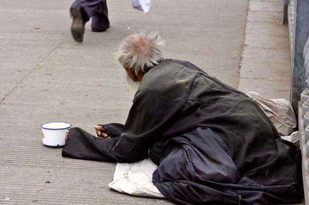 How do the rich, affluent, powerful, and wealthy break and destroy the idols that blind them and make them deaf? They accept the invitation to a kingdom, the kingdom of heaven, where the poor in spirit (the actual poor among them, the outcasts, marginal, uneducated, the sick, infirmed, and afflicted, and mentally unstable; cf. Matthew 4:24-5:1); where those who mourn for lack of recourses; and, where the meek, that is the powerless, have the kingdom, will be comforted, and shall inherit the earth. This is the kingdom to which the affluent, wealthy, and the advantaged, that is the powerful and resource-rich are invited. Of course, these lines in the list of Beatitudes are for all who seek first God’s kingdom and his righteousness. I am here focused on the powerful and resource-rich who hear this gracious invitation to the kingdom of Heaven. This is the kingdom to which the powerful and resource-rich are invited, a kingdom where they thirst and hunger for justice [yes, that’s exactly how I believe Jesus meant it]; where they will extend mercy because it is the merciful that will receive mercy; where the clean in heart make room for the unclean, because they see God; where they will be peace-makers, because they will be called Sons of God. This is an impossible invitation: for those who have been made blind and deaf and immovable because of their idols, these need the gospel, the power of God unto salvation. This is why Jesus died on that cross. This is the way in which God changed the world—really, the way in which he brought into existence, the reality of his recreated world, his kingdom of heaven. Yet, still, these words of the Beatitude are an invitation, waiting for you, through the gospel of Jesus Christ, to accept. In the end, both at our death and at the end of time, this is the kingdom that matters, the only kingdom that will remain. It is the kingdom of heaven to whom God, the Most High, will give to his saints (Daniel 7:18). This is why it makes sense that “the poor in spirit” are blessed, “because theirs is this kingdom.”
It is so far easier for advantaged (aka privileged) Christians to identify, condemn, discipline, and correct sexual sins than it is idolatry and greed and covetousness (which is idolatry); for, these latter sins are harbored in our hearts and bank accounts, addresses, and processions. Note to those drawn above to “sexual immorality, impurity, passion . . .” (you know, but Paul says . . . ). These have more to do with how men treated women and little boys as a matter of attitude, class, and sexual enjoyment (i.e., “evil desire”), especially around the deipnon (or evening banquet-supper) common in Greco-Roman households of advantage. Paul is most certainly applying the gospel to the hierarchical relationships where men are at the center of everything and apt to do as they want, which did not bode well for women and children (especially young, pubescent boys). The sexual references (i.e., sexual the prohibitions, actually) were to undo such male (especially, advantaged male) proclivities assumed and, sadly, to well accepted in social relationships. This is what needed to be changed; thus, the references point to the sins of inequality, class, misogyny, pedophilia, and male pride. So . . . perhaps we simply go with what is easy to condemn, i.e., sexual sins, because the English words give us power to do so and we love our greed (idolatry) and think ourselves better than others at way too many levels than we, that is, advantaged Christians [dare I say, advantaged Christian men?] care to admit or to confess. No wonder the Beatitudes [yes, I know I am making what seems a long jump at a cross reference here, but it's a fair one] were centered (at least initially focused; cf. Matthew 5:3-5) on the poor, mourning, and meek, for Jesus (“seeing the crowds,” Mat 5:1; cf. 4:24) was turning the tables [yes, that’s a pun on the Lord’s Supper stolen and recreated from the cultural supper-banquet where such sins occurred]–turning the tables on us all. We, especially advantaged Christians, need to rethink sin and perhaps lament, confess, and repent of the idolatries that reside in our hearts and behaviors and bank accounts and addresses before we focus on the too-easy-to-condemn sexual sins of others.
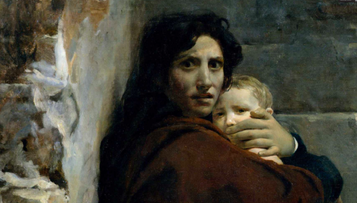 While Christians are lulled into the gladness and glitter of this highly commercialized and consumer-oriented season, not a day goes by without a wave of human tragedy crashing in on our souls, whether personally or through talking-head news, social media, or on the front pages of our news rags. Yet, we persist in counting this season as one of joy and good cheer Furthermore, we take our annual offense at church outsiders for taking the "Merry Christmas" out of our sacred season. Nonetheless, Christians underestimate our unbelieving and unchurched neighbors and friends. We dismiss the possibility that, in their own way, they might actually be seriously seeking answers—ultimate answers—about life, death, faith, and God. Often, however, it is our particular version of Christianity that has been rejected or held in suspicion, not the biblical one presented in the pages of our New Testament. Sociologist and Christian author Os Guinness writes that to the believer Christianity “was once life’s central mysteries, its worship life’s most awesome experience, its faith life’s broadest canopy of meaning . . .” But, today, he laments, no matter how passionate or committed an individual believer may be, Christianity often amounts to little more than a private preference, a spare time hobby. Such a faith and church experience is insufficient for our time—insufficient for our unbelieving neighbors. Our modern version of Christianity and, in particular at this time of the year, the contemporary Hallmark Card version of the Christmas story, is significant when we consider how non-believers view the church and its message. For serious seekers, such spare-time faith is not a solution to their deepest needs. Christianity must be more than a cozy warm blanket; something more ultimate to raise one up above one’s immediate and very felt needs. Amid the glad tidings often associated with the Christmas story is an oft-missed dose of “reality” etched into the biblical scene. The original story of the Savior's birth was accompanied, grievously, by the slaughter of innocent children. “Then when Herod saw that he had been tricked by the magi, he became very enraged, and sent and slew all the male children who were in Bethlehem and all its vicinity, from two years old and under, according to the time which he had determined from the magi” (Matt 2:16). Along with shouts of exultation from shepherds, homage from the Magi, and angels praising God, there is another voice we need to hear:
These are strange words coming in the midst of this joyous occasion we call Christmas. Yet, they must be heard, a reminder that lament and despair grip the human experience. The first time we meet this Old Testament character, Rachel, is at that delightful moment when she thought she would be marrying the love of her life, the young patriarch Jacob. But the story turns quickly to despair: Rachel’s father deceives Jacob into first marrying Leah, her older sister. Then, as the story continues, to make matters worse, Leah has eight sons as Rachel remained childless and we hear her wail the depths of her barrenness. God eventually takes Rachel’s reproach away by giving her a son, Joseph, Israel’s future deliverer. But, while giving birth to her second son she hears news that Joseph, her first-born, had been murdered. Upon receiving this news, “Rachel began to give birth and had great difficulty.” Then, reflecting on her anguish she names her newest born son “trouble” (Benjamin) and she dies and is buried by the roadside on the way to Bethlehem. (Yes, that's right, Bethlehem. See the Christmas connection!). Rachel’s story, as well as the original Christmas story, is surrounded by the swing between suffering and gladness, between despair and hope. The very realities of life.
The gospel story is pictured in Rachel’s cry, that is, of God’s Son ending up on a cross, rejected, and dying the cruelest of deaths. The reality of life, its pain and often unfairness, demand that one must turn to the God of Golgotha, who alone can provide the relief, the comfort, not simply mere sentimentalism or “spare-time” religious experiences. No other hope except God’s work in Christ can penetrate our neighbor’s deepest hurts or pierce their loneliest moments, or lift them above their needs. Amid the tinsel and cheerfully wrapped presents, let us remember Christ’s birth wasn’t to increase retail, but to bring good news that would meet the deepest needs and light the darkest space of the human experience. Our unbelieving, skeptical friends and neighbors deserve no less. And in this, they might find the real Christianity they need and the hope they long for.
|
AuthorChip M. Anderson, advocate for biblical social action; pastor of an urban church plant in the Hill neighborhood of New Haven, CT; husband, father, author, former Greek & NT professor; and, 19 years involved with social action. Archives
February 2024
Categories
All
|
Pages |
More Pages |
|
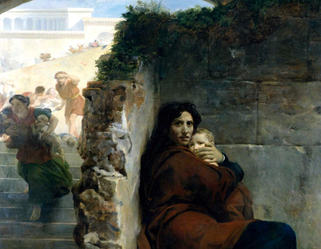
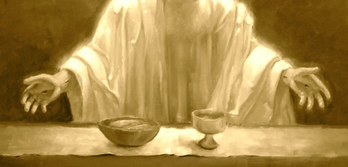

 RSS Feed
RSS Feed